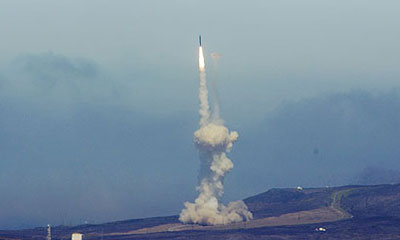
American plans to build part of their controversial anti- missile defense system in the Czech Republic has sparked debate in the central European country and mobilized progressive forces who oppose it. Several hundred turned up on a chilly, snowy day in late January on Wenceslas Square in the Czech capital, Prague, just part of a multi- pronged campaign against the plan. Hinting at the Soviet crackdown on the “Prague Spring” reform movement of 1968, demonstrators held up placards reading: “1968 – Go Home, Ivan! 2007 – Go home, John!” Pavel, a Prague university student said he was tired of his government “kissing someone’s ass.” The Bush administration announced on January 20 that Washington had asked the Czech Republic and Poland to base parts of the system. Under the proposal, the Czechs would house the radar system and the Poles the silos with 10 rockets to shoot down missiles fire from “rogue regimes” like Iran and North Korea. The U.S. already has missile interceptor sites in California and Alaska. A missile site in Poland would be the first outside the U.S. and the only one in Europe. Public reaction to the proposal in both countries has been lukewarm at best, while Moscow has criticized it with rhetoric reminiscent of the Cold War. Critics see it as the latest American move to expand its military grip around the globe. “The government does not have a mandate to authorize the base,” Jan Tamas, the main organizer of the “No Base” movement, which is calling for the government to at least let the people vote on the proposal. Prime Minister Mirek Topolanek has balked at the idea of holding a referendum, arguing, “security issues usually are not decided by referendum.” “Locating the base here will undoubtedly improve the security of the Czech Republic and Czech citizens,” Topolanek said. But many Czechs fear the base will make them a target of a terrorist attack as they are dragged into Washington’s geopolitical schemes. Nevertheless, several vox populi show a majority of Czechs actually back the plan, perhaps hoping the U.S. will at least drop visa requirements for them. Also lingering fears of Russia, may tip the Poles and Czechs into the arms, literally, of the Americans. Backers also see it as a chance for the Czech Republic to do its part in the global “war on terror,” among them the former dissident, playwright and president, Vaclav Havel, who has backed many an American intervention, including the Iraqi war. “Do the Czechs want to be a modern European society, which feels a shared responsibility for the state of the world, or would we prefer to leave the resolution of global problems to others,” Havel asked. Topolanek will face a tough task winning parliamentary backing for the American plan. His fragile center-right government was cobbled together after seven months of on-again, off-again talks. Topolanek’s Civic Democratic generally backs the radar scheme, but coalition partner the Christian Democrats are less enthusiastic and the third and oddest member of the government, the Greens, are the most hostile, saying it could back the plan if it is part of a NATO system and not just an American one. The leader of the opposition Social Democrats, Jiri Paroubek, has said most members of his party oppose the idea. The Czech and Moravian Communist Party are firmly in the opposition camp. Perhaps, some of the wariest Czechs are those living in Jince, about 30 miles southwest of Prague, where the U.S. wants to base the radar installation at a former military site. Protests have been held there as well. Foreign Minister Karel Schwarzenberg was dispatched to the region in early February to meet nervous local mayors, reassuring them that hosting about 200 Americans will pump up the local economy. Convincing the mayors will be easier than Moscow. Vladimir Popovkin, who commands the country's space forces, has said, "The radar in the Czech Republic would be able to monitor rocket installations in central Russia and the Northern Fleet." Russia wants Washington to put in writing that the missile system is not aimed at it, according to an Interfax report on February 6. “The Russians say ‘this is my backyard. You need our cooperation.’ They are right. You cannot stop Iran or contain Iran without Russia. You need the Russians onboard, “ Andrew Brookes, a space technology expert at London’s International Institute for Strategic Studies, told the AFP news agency. Some experts argue there is no point, militarily at least, to building another radar station in the Czech Republic. Bruno Gruselle, researcher at the Paris-based Strategic Research Foundation said “the U.S. military already has radar stations in Norway, in Greenland, and in Britain—on top of its Defense Support System satellite alert system – which permit the early detection of missiles, wherever they come from.” Rarely if ever mentioned in the debate is whether the system will ever be operable. After spending more than $100 billion on missile defense, the U.S. hasn’t proved the system can work. Test results have been mixed at best. Not many officials in Prague or Warsaw are talking about that.
No comments:
Post a Comment